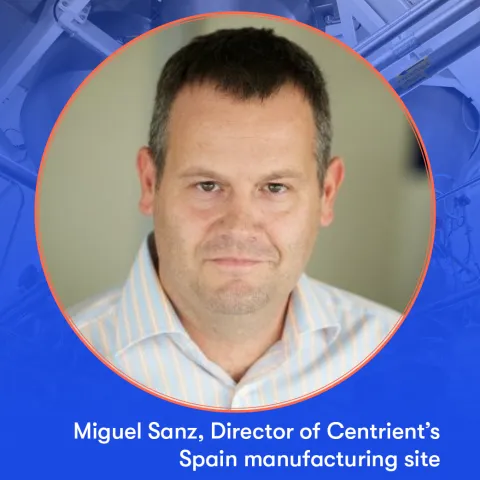25 years of sustainable Cephalexin production in Centrient Spain
Until the 20th century, infections that we now consider straightforward to treat such as pneumonia and diarrhoea brought on by bacteria were the number one cause of human death in the developed world. The discovery of penicillin by Alexander Fleming was a game-changer in medicine in the twentieth century. Doctors widely used penicillin during World War II and gave it to soldiers to treat infections caused by gram-positive bacteria they developed after being wounded in battle. Later, cephalosporins, another important class of beta-lactam antibiotics, were discovered and put on an industrial production scale. Today, antibiotic medications are the most important type of antibacterial agent and are widely used in treating bacterial infections.
Classified into five generations, cephalosporin antibiotics are prescribed to treat respiratory and urinary tract infections, strep throat, meningitis, and skin and bone infections. They are typically given to patients allergic to penicillin. All three Centrient-produced Active Pharmaceutical Ingredients (APIs) in the first-generation cephalosporins (Cephalexin, Cefadroxil and Cefradine) are in the Access group of the World Health Organization (WHO). The WHO Access, Watch, and Reserve (AWaRe) classification aims to balance appropriate antibiotic access and stewardship by categorizing antibiotics into three groups: Access, Watch, and Reserve. Access antibiotics are used as first or second-line therapies and should be widely available, affordable, and high-quality. Cephalexin is one of the most important members of the first-generation family of cephalosporin antibiotics.
Centrient Spain is the oldest and one of the only two remaining producers of cephalosporins in Europe. We opened our manufacturing site in Santa Perpetua de Mogoda, Spain, in 1981. In 1997, we replaced the traditional chemical production of Cephalexin with a sustainable, enzymatic method developed by our scientists. Our PureActives® enzymatic platform replaces traditional production steps with a unique patented enzymatic technology that eliminates the use of solvents or other chemicals. Today, every second patient receives Cephalexin produced using Centrient’s API from our manufacturing site in Spain. The key intermediate for producing Cephalexin API - 7-ADCA comes from Centrient's other European site in the Netherlands, the only site of its kind outside India and China.
Miguel Sanz, director of Centrient's Spain manufacturing site, notes: ¨Having worked at the Santa Perpetua site for the last 25 years, I am proud of the level of sustainability we achieved here. Our enzymatic production method delivers over 63% lower carbon footprint than traditional chemical production. The site is powered by electricity from entirely renewable sources. Our enzymatic production process is water-based, and we are using much less solvent than traditional chemical processes. The wastewater from our production is treated responsibly. We are AMR free in all our liquid streams since the beginning of 2022. We are committed to a lasting and sustainable future for our local community here and the patients and customers worldwide.¨
Everything we do at Centrient is driven by our purpose – improving lives through innovative and sustainable manufacturing of medicines. Our enzymatically produced antibiotic APIs do not pollute the environment and are not likely to contribute to antimicrobial resistance caused by environmental pollution from manufacturing. Our antibiotics are the world's purest and most environmentally friendly produced APIs and finished dosage forms. We are fully committed to keeping the essential antibiotics effective now and for future generations.

